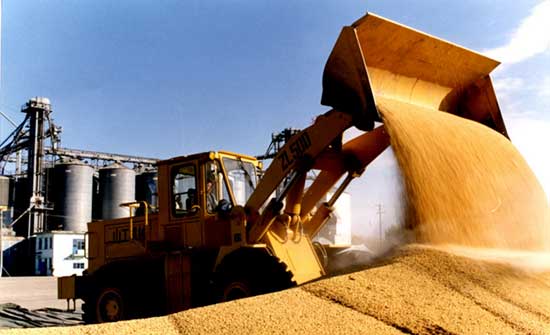

 |
| (File Photo) |
China's grain output increased for 12 years in a row and totaled about 621 million tonnes in 2015. At the same time, grain stocks reached their highest level and imports witnessed continuous growth, which are estimated to exceed 120 million tonnes in 2015.
But why did China import large quantities of food since it had enjoyed a bumper harvest for 12 years in a row? Chen Xiwen, deputy director of the Central Rural Work Leading Group, said that although China saw increases in grain harvests year after year, yet compared to the consumption, it is still not enough. Soybeans, rice, wheat and corn need to be imported to meet the demand, according to Chen.
Data released from the General Administration of Customs show that among the 120 million tonnes of imported grain, corn accounted for the biggest share, up 14.4 percent from 2014.
Chen attributed the spontaneous growth in output, stockpiling and imports to price contradictions between domestic and international grain prices, and the domestic demand structure.
Over the past 15 years, there have been significant changes in the structure of grain yields. With the continuous decrease in soybean yield and rapid increase in consumption, over 80 percent of soybeans need to be imported. This is one of the obvious contradictions in the current food supply and demand.
The problem of structural shortage of some varieties of grain is rather prominent. Import can make up for the supply shortage of grain varieties in the domestic market. For example, China's corn output have increased by 100% over the past 15 years. "However, those grain varieties witnessing increase in production are not necessarily what consumers need, while those suffering decrease in production is much needed. That is the prominent imbance of supply and demand," Chen said.
The other is China has no competitiveness in agricultural commodities on the world market. "Despite the increase in grain production in recent years, the costs were also rising, resulting in the increase of domestic grain prices and thus more grains were imported to Chinese market from abroad,” Chen analyzed.
In addition, there are other factors which resulted in the higher domestic prices, which include the sharp decline of world grain prices in recent years, the strong Chinese yuan and tumbling international shipping prices.
 A foreign girl explains what China should be proud of
A foreign girl explains what China should be proud of Chinese navy's air-cushioned landing craft in pictures
Chinese navy's air-cushioned landing craft in pictures Chinese pole dancing master opens class in Tianjin
Chinese pole dancing master opens class in Tianjin PLA holds joint air-ground military drill
PLA holds joint air-ground military drill Charming female soldiers on Xisha Islands
Charming female soldiers on Xisha Islands Beautiful skiers wear shorts in snow
Beautiful skiers wear shorts in snow Getting close to the crew on China's aircraft carrier
Getting close to the crew on China's aircraft carrier Chinese stewardess celebrate test flight at Nansha Islands
Chinese stewardess celebrate test flight at Nansha Islands Pentagonal Mart becomes the largest vacant building in Shanghai
Pentagonal Mart becomes the largest vacant building in Shanghai Top 20 hottest women in the world in 2014
Top 20 hottest women in the world in 2014 Top 10 hardest languages to learn
Top 10 hardest languages to learn 10 Chinese female stars with most beautiful faces
10 Chinese female stars with most beautiful faces China’s Top 10 Unique Bridges, Highways and Roads
China’s Top 10 Unique Bridges, Highways and Roads ‘The Monkey King’ sequel leaps ahead of original
‘The Monkey King’ sequel leaps ahead of original Snow my God! Fun times during China’s deep freeze
Snow my God! Fun times during China’s deep freeze Telecom scammers cheat victims out of thousands of yuan
Telecom scammers cheat victims out of thousands of yuan Homeless people try to survive subzero temperatures in Beijing
Homeless people try to survive subzero temperatures in BeijingDay|Week